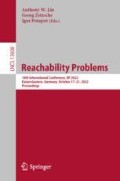Abstract
In this short survey we describe recent advances on the Post Correspondence Problem in group theory that were inspired by results in computer science. These algebraic advances can, in return, provide a source of interesting problems in more applied, computational settings.
Post’s Correspondence Problem (PCP) is a classical decision problem in theoretical computer science that asks whether for a pair of free monoid morphisms \(g, h:\varSigma ^*\rightarrow \varDelta ^*\) there is any non-trivial \(x\in \varSigma ^*\) such that \(g(x)=h(x)\). One can similarly phrase a PCP for general groups, rather than free monoids, by asking whether pairs g, h of group homomorphisms agree on any inputs. This leads to interesting and unexpected (un)decidability results for PCP in groups.
Access this chapter
Tax calculation will be finalised at checkout
Purchases are for personal use only
References
Baumslag, G., Cannonito, F.B., Robinson, D.J., Segal, D.: The algorithmic theory of polycyclic-by-finite groups. J. Algebra 142(1), 118–149 (1991). https://doi.org/10.1016/0021-8693(91)90221-S, https://doi.org/10.1016/0021-8693(91)90221-S
Belegradek, I., Osin, D.: Rips construction and Kazhdan property (T). Groups Geom. Dyn. 2(1), 1–12 (2008). https://doi.org/10.4171/GGD/29, https://doi.org/10.4171/GGD/29
Blackburn, N.: Conjugacy in nilpotent groups. Proc. Amer. Math. Soc. 16, 143–148 (1965). https://doi.org/10.2307/2034018, https://doi.org/10.2307/2034018
Bogopolski, O., Maslakova, O.: An algorithm for finding a basis of the fixed point subgroup of an automorphism of a free group. Internat. J. Algebra Comput. 26(1), 29–67 (2016). https://doi.org/10.1142/S0218196716500028
Ciobanu, L., Elder, M.: The complexity of solution sets to equations in hyperbolic groups. Israel J. Math. 245(2), 869–920 (2021). https://doi.org/10.1007/s11856-021-2232-z, https://doi-org.ezproxy.st-andrews.ac.uk/10.1007/s11856-021-2232-z
Ciobanu, Laura, Logan, Alan D..: Variations on the Post correspondence problem for free groups. In: Moreira, Nelma, Reis, Rogério (eds.) DLT 2021. LNCS, vol. 12811, pp. 90–102. Springer, Cham (2021). https://doi.org/10.1007/978-3-030-81508-0_8
Ciobanu, L., Martino, A., Ventura, E.: The generic Hanna Neumann Conjecture and Post Correspondence Problem (2008). http://www-eupm.upc.es/~ventura/ventura/files/31t.pdf
Ciobanu, L., Logan, A.D.: The post correspondence problem and equalisers for certain free group and monoid morphisms. In: 47th International Colloquium on Automata, Languages, and Programming (ICALP 2020), pp. 120:1–120:16 (2020)
Dahmani, F., Guirardel, V.: Foliations for solving equations in groups: free, virtually free, and hyperbolic groups. J. Topol. 3(2), 343–404 (2010). https://doi.org/10.1112/jtopol/jtq010, https://doi-org.ezproxy.st-andrews.ac.uk/10.1112/jtopol/jtq010
Duchin, M., Liang, H., Shapiro, M.: Equations in nilpotent groups. Proc. Amer. Math. Soc. 143(11), 4723–4731 (2015). https://doi.org/10.1090/proc/12630, https://doi.org/10.1090/proc/12630
Ehrenfeucht, A., Karhumäki, J., Rozenberg, G.: The (generalized) Post correspondence problem with lists consisting of two words is decidable. Theoret. Comput. Sci. 21(2), 119–144 (1982). https://doi.org/10.1016/0304-3975(89)90080-7
Feighn, M., Handel, M.: Algorithmic constructions of relative train track maps and CTs. Groups Geom. Dyn. 12(3), 1159–1238 (2018). https://doi.org/10.4171/GGD/466
Garreta, A., Miasnikov, A., Ovchinnikov, D.: Random nilpotent groups, polycyclic presentations, and Diophantine problems. Groups Complex. Cryptol. 9(2), 99–115 (2017). https://doi.org/10.1515/gcc-2017-0007, https://doi.org/10.1515/gcc-2017-0007
Gilman, R., Miasnikov, A.G., Myasnikov, A.D., Ushakov, A.: Report on generic case complexity (2007). https://arxiv.org/pdf/0707.1364v1.pdf
Goldstein, R.Z., Turner, E.C.: Fixed subgroups of homomorphisms of free groups. Bull. London Math. Soc. 18(5), 468–470 (1986). https://doi.org/10.1112/blms/18.5.468
Halava, V., Hirvensalo, M., de Wolf, R.: Marked PCP is decidable. Theoret. Comput. Sci. 255(1–2), 193–204 (2001). https://doi.org/10.1016/S0304-3975(99)00163-2
Harju, T., Karhumäki, J.: Morphisms. In: Handbook of Formal Languages, Vol. 1, pp. 439–510. Springer, Berlin (1997). https://doi.org/10.1007/978-3-642-59136-5
Kapovich, I., Myasnikov, A., Schupp, P., Shpilrain, V.: Generic-case complexity, decision problems in group theory, and random walks. J. Algebra 264(2), 665–694 (2003)
Karhumäki, J., Saarela, A.: Noneffective regularity of equality languages and bounded delay morphisms. Discrete Math. Theor. Comput. Sci. 12(4), 9–17 (2010)
König, D., Lohrey, M.: Evaluation of circuits over nilpotent and polycyclic groups. Algorithmica 80(5), 1459–1492 (2018). https://doi.org/10.1007/s00453-017-0343-z, https://doi-org.ezproxy.st-andrews.ac.uk/10.1007/s00453-017-0343-z
König, D., Lohrey, M., Zetzsche, G.: Knapsack and subset sum problems in nilpotent, polycyclic, and co-context-free groups. Algebra Comput. Sci. Contemp. Math. 677, 129–144. American Mathematical Society, Providence, RI (2016). https://doi.org/10.1090/conm/677, https://doi-org.ezproxy.st-andrews.ac.uk/10.1090/conm/677
Laura Ciobanu, A.D.L.: Fixed points and stable images of endomorphisms for the free group of rank two. J. Algebra 591, 538–576 (2022). https://doi.org/10.1007/BF02095993
Lecerf, Y.: Récursive insolubilité de l’équation générale de diagonalisation de deux monomorphismes de monoïdes libres \(\varphi x=\psi x\). C. R. Acad. Sci. Paris 257, 2940–2943 (1963)
Levine, A., Logan, A.D.: On Post’s correspondence problem for hyperbolic and virtually nilpotent groups. 17, 991–1008, (2022, work in progress)
Lo, E.H.: Finding intersections and normalizers in finitely generated nilpotent groups. J. Symbolic Comput. 25(1), 45–59 (1998). https://doi.org/10.1006/jsco.1997.0166, https://doi.org/10.1006/jsco.1997.0166
Myasnikov, A., Nikolaev, A., Ushakov, A.: The Post correspondence problem in groups. J. Group Theory 17(6), 991–1008 (2014)
Neary, T.: Undecidability in binary tag systems and the Post correspondence problem for five pairs of words 30, 649–661 (2015)
Neumann, H.: Varieties of Groups. Springer-Verlag, New York (1967). https://doi.org/10.1007/978-3-642-88599-0
Post, E.L.: A variant of a recursively unsolvable problem. Bull. Amer. Math. Soc. 52, 264–268 (1946). https://doi.org/10.1090/S0002-9904-1946-08555-9
Repin, N.N.: Equations with one unknown in nilpotent groups. Mat. Zametki 34(2), 201–206 (1983)
Rips, E.: Subgroups of small cancellation groups. Bull. London Math. Soc. 14(1), 45–47 (1982). https://doi.org/10.1112/blms/14.1.45, https://doi-org.ezproxy.st-andrews.ac.uk/10.1112/blms/14.1.45
Roman’kov, V.A.: Unsolvability of the problem of endomorphic reducibility in free nilpotent groups and in free rings. Algebra i Logika 16(4), 457–471, 494 (1977)
Roman’kov, V.A.: Diophantine questions in the class of finitely generated nilpotent groups. J. Group Theory 19(3), 497–514 (2016). https://doi.org/10.1515/jgth-2016-0504, https://doi.org/10.1515/jgth-2016-0504
Stallings, J.R.: Graphical theory of automorphisms of free groups. In: Combinatorial Group Theory and Topology (Alta, Utah, 1984), Annals of Mathematics Studies, vol. 111, pp. 79–105. Princeton University Press, Princeton (1987). https://doi.org/10.1007/978-1-4612-4372-4
Author information
Authors and Affiliations
Corresponding author
Editor information
Editors and Affiliations
Rights and permissions
Copyright information
© 2022 The Author(s), under exclusive license to Springer Nature Switzerland AG
About this paper
Cite this paper
Ciobanu, L. (2022). Post’s Correspondence Problem: From Computer Science to Algebra. In: Lin, A.W., Zetzsche, G., Potapov, I. (eds) Reachability Problems. RP 2022. Lecture Notes in Computer Science, vol 13608. Springer, Cham. https://doi.org/10.1007/978-3-031-19135-0_2
Download citation
DOI: https://doi.org/10.1007/978-3-031-19135-0_2
Published:
Publisher Name: Springer, Cham
Print ISBN: 978-3-031-19134-3
Online ISBN: 978-3-031-19135-0
eBook Packages: Computer ScienceComputer Science (R0)

